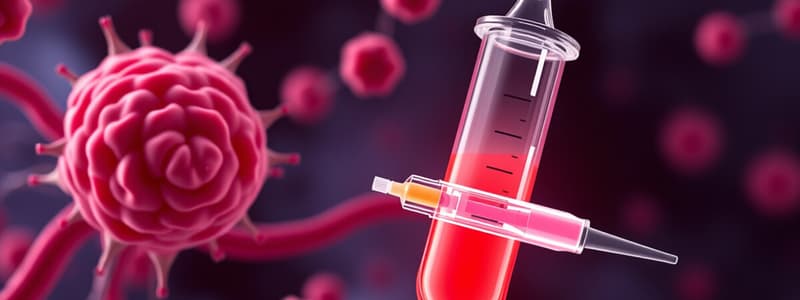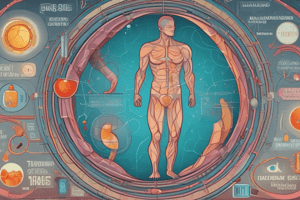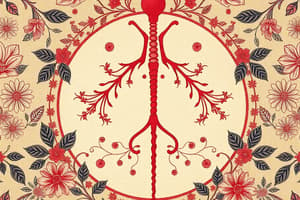Podcast
Questions and Answers
Which statement about monosaccharides is true?
Which statement about monosaccharides is true?
- They are simple sugars with the general formula Cn(H2O)n. (correct)
- They are not soluble in water.
- They are composed of at least three monosaccharide units.
- They consist of multiple glycosidic bonds.
What is the primary function of carbohydrates in metabolism?
What is the primary function of carbohydrates in metabolism?
- They act as hormones to regulate body functions.
- They provide insulation and protection for organs.
- They are the building blocks for proteins.
- They serve as the main source of energy for cellular activities. (correct)
Which type of carbohydrate consists of 3-10 monosaccharide units?
Which type of carbohydrate consists of 3-10 monosaccharide units?
- Disaccharides
- Oligosaccharides (correct)
- Monosaccharides
- Polysaccharides
Which of the following conditions could result from a deficiency in glycogen storage?
Which of the following conditions could result from a deficiency in glycogen storage?
Which of the following is a characteristic of polysaccharides?
Which of the following is a characteristic of polysaccharides?
What type of linkages are present in glycogen?
What type of linkages are present in glycogen?
Which of the following correctly describes the storage locations of glycogen in the body?
Which of the following correctly describes the storage locations of glycogen in the body?
Which property distinguishes acidic polysaccharides from other polysaccharides?
Which property distinguishes acidic polysaccharides from other polysaccharides?
What role does glycogen play during exercise?
What role does glycogen play during exercise?
Which of the following acidic polysaccharides has an unbranched structure?
Which of the following acidic polysaccharides has an unbranched structure?
What is the primary consequence of glycogen breakdown during fasting?
What is the primary consequence of glycogen breakdown during fasting?
What type of carbohydrate is glycogen categorized as?
What type of carbohydrate is glycogen categorized as?
What is a characteristic feature of hyaluronic acid?
What is a characteristic feature of hyaluronic acid?
What role does insulin play in glucose regulation?
What role does insulin play in glucose regulation?
What happens to excess glucose in the body?
What happens to excess glucose in the body?
Which hormone is released when blood glucose levels drop?
Which hormone is released when blood glucose levels drop?
How is glucose primarily utilized by the body's cells?
How is glucose primarily utilized by the body's cells?
What is gluconeogenesis?
What is gluconeogenesis?
What effect does epinephrine have on glucose levels?
What effect does epinephrine have on glucose levels?
Where is glycogen primarily stored in the body?
Where is glycogen primarily stored in the body?
Which of the following describes a primary function of carbohydrates?
Which of the following describes a primary function of carbohydrates?
Flashcards are hidden until you start studying
Study Notes
Glucose Metabolism and Regulation
- Glucose requires insulin to enter cells; without it, cells cannot absorb glucose and would starve.
- After consuming food, blood sugar increases, prompting the pancreas to automatically release insulin.
- Insulin facilitates glucose entry into cells, normalizing blood sugar levels.
- Excess glucose is converted to glycogen, stored primarily in the liver (1/3) and muscles (2/3).
Hormonal Regulation of Blood Glucose
- Insulin: Reduces blood sugar levels by promoting glucose uptake by cells.
- Glucagon: Released when blood sugar is low; stimulates liver to release stored glucose, raising blood sugar levels.
- Epinephrine: Triggers glucose release during emergencies, providing quick energy.
Glycogen as a Key Energy Source
- Glycogen is an animal polysaccharide made of long chains of glucose, also known as "animal starch."
- It helps maintain blood glucose levels and serves as a quick energy source, particularly during exercise, but lasts around 12 hours.
- Glycogen structure is similar to amylopectin, with both (1→4) and (1→6) glycosidic linkages.
Digestion and Absorption of Carbohydrates
- Carbohydrates undergo digestion in the mouth, stomach, and small intestine, breaking down into glucose.
- Glucose enters the bloodstream and travels to cells for energy utilization.
Acidic Polysaccharides
- Acidic polysaccharides, such as hyaluronic acid and heparin, feature disaccharide repeating units, often involving negative charges due to sulfate or carboxyl groups.
- Important for various cellular functions; they contribute to tissue processes.
Biochemical Investigations and Disease
- Biochemical testing reveals underlying disease mechanisms, suggesting rational treatments, and aids in diagnosing specific diseases.
- Examples include dietary adjustments for cystic fibrosis and utilizing plasma enzyme levels to diagnose myocardial infarction.
Carbohydrate Classification
- Simple Carbohydrates: Includes monosaccharides (single sugar units) and disaccharides (two sugar units).
- Complex Carbohydrates: Comprises oligosaccharides (3-10 sugar units) and polysaccharides (long chains of monosaccharides).
Studying That Suits You
Use AI to generate personalized quizzes and flashcards to suit your learning preferences.




